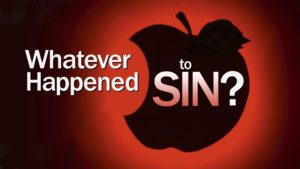The Lord be with you
Today, the word “sin” has lost its power and awesome intensity. It’s used most frequently in the context of fattening desserts. Most people in daily conversation don’t talk much about individual sin. If they talk about human evil at all, that evil is most often located in the structures of society – in inequality, oppression, racism, and so on – not in the human breast. …
 But in truth, “sin,” like “vocation” and “soul,” is one of those words that it is impossible to do without. …
But in truth, “sin,” like “vocation” and “soul,” is one of those words that it is impossible to do without. …
Sin is a necessary piece of our mental furniture because it reminds us that life is a moral affair. No matter how hard we try to reduce everything to deterministic brain chemistry, no matter how hard we try to reduce behavior to the sort of herd instinct that is captured in big data, no matter how hard we strive to replace sin with nonmoral words, like “mistake” or “error” or “weakness,” the most essential parts of life are matters of individual responsibility and moral choice: whether to be brave or cowardly, honest or deceitful, compassionate or callous, faithful or disloyal. When modern culture tries to replace sin with ideas like error or insensitivity, or tries to banish words like “virtue,” “character,” “evil,” and “vice” altogether, that doesn’t make life any less moral; it just means we have obscured the inescapable moral core of life with shallow language. It just means we think and talk about these choices less clearly, and thus become increasingly blind to the moral stakes of everyday life. … The concept of sin is necessary because it is radically true. –David Brooks, The Road to Character (Random House, 2015), 53-54
This quote was found in “Forum Letter,” volume 45, number 6, June 2016
Blessings in Christ,
Pastor
